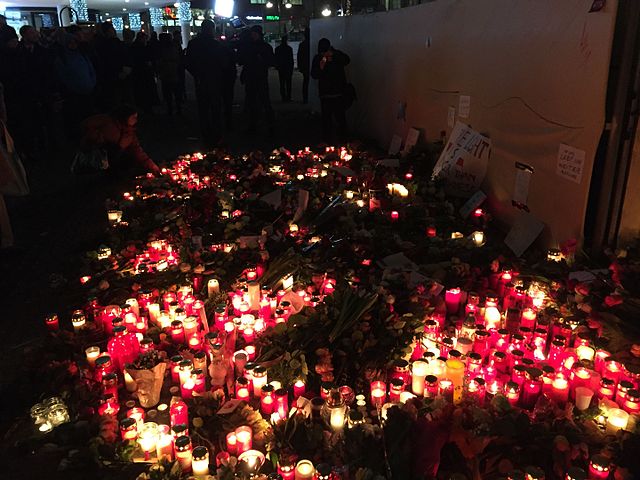German terrorist attack strikes fear in citizens
Photo via Google under Creative Commons license
Germany mourned those lost in the Christmas market attack, holding vigils, as shown above.
The truck flew down the narrow alleys of a Berlin Christmas market, with a Muslim man named Anis Amri behind the wheel. He hit several people and then crashed next to the Kaiser Wilhelm Memorial Church. This is the horrible story of the event known as the Berlin Christmas market attack, which took place on the evening of Dec. 19, a mere week before Christmas.
That day, the truck was driven by a Polish man, who had driven it around Berlin for 15 years, making deliveries. Amri hijacked the vehicle that night and drove it to the market, where he committed this crime. ISIS quickly claimed responsibility for the 12 people dead and about 50 people injured.
Amri is a Tunisian migrant who was seeking political asylum in Germany last year. Although his asylum was denied, he was not deported from the country. In 2015, Angela Merkel, the chancellor of Germany, made an open border policy, welcoming all middle-eastern refugees into the country, but now these policies are meeting extreme backlash from the public. According to a poll done by German political barometer found that 51 percent of citizens feel the government is not doing enough to protect the public from terrorism.
“It would be very difficult for us to learn that a human being who came to Germany to ask for refuge and asylum committed this deed,” Merkel stated. She said this while the police were still investigating Amri’s background.
After the attack, the Federal Minister of Justice came up with the idea to make suspected terrorists wear ankle tags so that the government can more effectively track threats. “The use of ankle tags should not be only available for convicted criminals after release from prison, but for those identified as a general threat as well,” he said.
This attack is very similar, although less lethal, than the terrorist attack in Nice, France last year. In that attack, 89 people were killed by a truck speeding through a shopping district. Both of these truck attacks could possibly be traced back to the chief spokesman of ISIS saying “run him over with your car,” referring to the targets of the terrorist group.
The attack makes the future in Germany uncertain, but Frauke Petry, the leader of the anti-immigration party called Alternative for Germany, sums up the emotions of the majority of the public: “Germany is no longer safe.”











